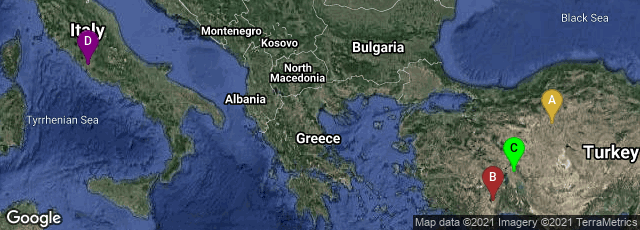
A: Ankara, Turkey, B: Antalya, Turkey, C: Isparta, Turkey, D: Roma, Lazio, Italy
After the death of Augustus in 14 CE copies of the Res gestae divi Augusti (The Deeds of the Divine Augustus), the first-person record of his life and accomplishments written by the first Roman emperor, were carved on stone on monuments or temples throughout the Roman Empire. According to the text it was written just before Augustus' death, but it was probably written years earlier and likely went through many revisions. Augustus left the text with his will, which instructed the Senate to set up the inscriptions. The original, which has not survived, was engraved upon a pair of bronze pillars and placed in front of Augustus' mausoleum in the Campus Martius in Rome. The most complete surviving copy, written in Latin with a Greek translation, was preserved on a temple to Augustus in Ancyra (now Ankara, Turkey). Others were been found at Apollonia and Antioch, both in Pisidia.
"The text consists of a short introduction, 35 body paragraphs, and a posthumous addendum. These paragraphs are conventionally grouped in four sections, political career, public benefactions, military accomplishments and a political statement. . . .
"By its very nature the Res Gestae is propaganda for the principate that Augustus instituted. It tends to gloss over the events between the assassination of Augustus' adoptive father Julius Caesar and the victory at Actium when his foothold on power was finally undisputed. Augustus' enemies are never mentioned by name. Caesar's murderers Brutus and Cassius are not referred to by name, they are simply "those who killed my father." The Battle of Philippi is mentioned only in passing and not by name. Mark Antony and Sextus Pompeius, Augustus' opponents in the East, remain equally anonymous; the former is "he with whom I fought the war," while the latter is merely a "pirate." Likewise, the text fails to mention his imperium maius and his exceptional tribunicial powers. Often quoted is Augustus' official position on his government: "From that time (27 BC, the end of the civil war) I surpassed all others in influence, yet my official powers were no greater than those of my colleague in office." This is in keeping with a reign that promoted itself from the beginning as a "restoration" of the old republic, with a leader who was nothing more than "first among equals," but was virtually akin to absolute monarchy by divine right, backed by the swords of the legions.
"The Res Gestae was a unique public relations move for the first emperor of the Roman Empire, whose political career was in many ways experimental. If their frequent use as "history" by later historians (both ancient and modern) who characterized Augustus' rule according to categories he himself constructed in the Res Gestae is any indication, it is a rather successful piece of propaganda. On the other hand, it would be absurd to overlook the usefulness to historians of what is essentially a first-person account of his rule" (Wikipedia article on Res Gestae Divi Augusti, accessed 09-23-2014.)